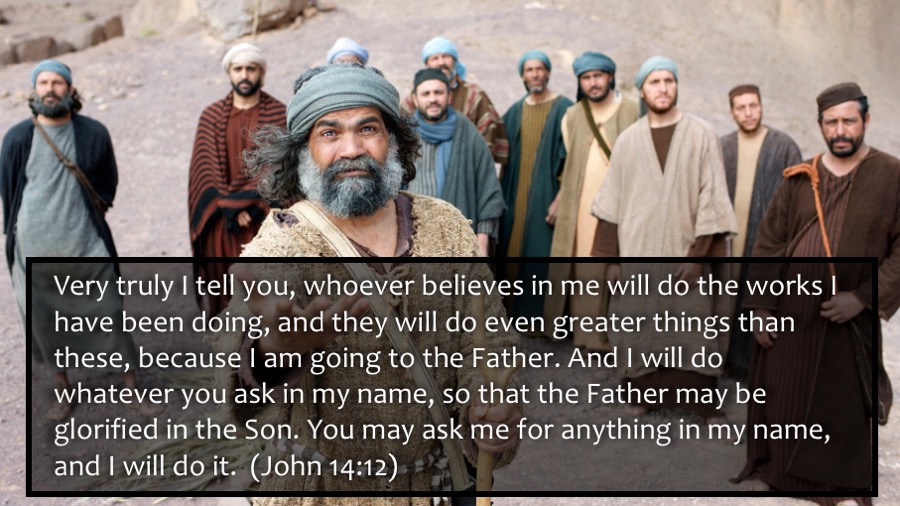WE CAN ACHIEVE MORE BY FOLLOWING JESUS CHRIST
THE SEED
“Truly, truly, I say to you, whoever believes in me will also do the works that I do; and greater works than these will he do, because I am going to the Father.” — John 14:12 (ESV)
The Bible clearly states that we were created good, in the image of God. With our salvation in Christ comes an even greater promise, as illustrated in the verse above. Jesus assures us that those who believe in Him will not only do the works He did, but even greater works. This is a profound truth with a divine purpose. When Jesus made this statement, He was preparing His disciples for a future they could barely comprehend. At the heart of His message was the desire to raise them as His representatives on earth after His ascension. To truly follow Jesus means more than just believing, it involves serving Him, obeying His teachings, and surrendering one’s life to His will. Jesus called His disciples to leave everything behind and follow Him. He promised that those who do so would receive the Holy Spirit, empowering them to do far beyond what they could ever dream or imagine. Following Christ demands the denial of self and personal ambition, choosing instead a life of wholehearted service to Him. Through His own life, Jesus demonstrated what it means to follow God. He went about doing good, healing the sick, delivering the oppressed, and proclaiming the kingdom because God was with Him (Acts 10:38). After Jesus ascended and the Holy Spirit came upon the disciples, their lives became powerful testimonies. They were recognized as men who had been with Jesus, and their ministries were marked by miracles, signs, and wonders (Acts 5:12).
BIBLE READING: Acts 4:8–14
PRAYER: Father Lord, enrol me in Your school of discipleship, that my life may bring glory and honour to You in Jesus’ name. Amen.
A LÈ ṢE ÀWỌN OHUN NLÁ SÍI NÍPA TÍTẸ̀LÉ JÉSÙ KRÍSTÌ
IRUGBIN NAA
“Lóòótọ́, lóòótọ́, mo wí fún yín, ẹnikẹ́ni tí ó bá gbà mí gbọ́ yóò ṣe àwọn iṣẹ́ tí èmi ń ṣe; iṣẹ́ tí ó tóbi ju ìwọ̀nyí lọ ni yóò sì ṣe, nítorí èmi ń lọ sí ọ̀dọ̀ Baba.” — Jòhánù 14:12 (ESV)
Bíbélì sọ ní kedere pé a dá wa dáradára, ní àwòrán Ọlọ́run. Pẹ̀lú ìgbàlà wa nínú Krístì wá ìlérí tí ó tóbi jù, gẹ́gẹ́ bí a ti fihan nínú ẹsẹ òkè. Jésù fi da wa lójú pé àwọn tí ó gbà á gbọ́ kò ní kàn ṣe àwọn iṣẹ́ tí Òun ti ṣe nìkan, ṣùgbọ́n àwọn iṣẹ́ tí ó pọ̀jù bẹ́ẹ̀ lọ. Èyí jẹ́ òtítọ́ tí ó jinlẹ̀ pẹ̀lú ète Ọlọ́run. Nígbà tí Jésù ṣe ọ̀rọ̀ yìí, Ó ń múra àwọn ọmọ-ẹ̀yìn rẹ̀ sílẹ̀ fún ọjọ́ iwájú tí
wọn fẹ́rẹ̀ mọ̀. Ní àárín ìṣàkíyèsí rẹ̀ ni ìfẹ́ láti gbé wọn dìde gẹ́gẹ́ bí aṣojú rẹ̀ lórí ilẹ̀ ayé lẹ́yìn ìgòkè rẹ̀. Láti tẹ̀lé Jésù ní tòótọ́ túmọ̀ sí ju gbígbàgbọ́ nìkan lọ, ó ní láti ṣe ìsìn fún un, gbígbọràn sí ẹ̀kọ́ rẹ̀, àti fífọwọ́ sílẹ̀ ìgbé ayé ẹni fún ìfẹ́ rẹ̀. Jésù pè àwọn ọmọ-ẹ̀yìn rẹ̀ láti fi ohun gbogbo sílẹ̀ kí wọ́n sì tẹ̀lé òun. Ó ṣèlérí pé àwọn tí ó bá ṣe bẹ́ẹ̀ yóò gba Ẹ̀mí Mímọ́, tí yóò fún wọn ní agbára láti ṣe ohun tí ó kọjá èrò àti òye wọn. Títẹ̀lé Krístì béèrè fún ìsẹ́ ara ẹni àti ìfẹ́ ara ẹni, kí a sì yan ìgbé ayé ìsìn ọkàn-gbogbo fún un dípò bẹ́ẹ̀. Nípasẹ̀ ìgbé ayé rẹ̀, Jésù fi àpẹẹrẹ ohun tí ó túmọ̀ sí láti tẹ̀lé Ọlọ́run. Ó lọ káàkiri ṣíṣe rere, ìwòsàn fún àwọn aláìsàn, ìdásílẹ̀ fún àwọn tí a ni lára, àti kíkéde ìjọba Ọlọ́run nítorí pé Ọlọ́run wà pẹ̀lú rẹ̀ (Ìṣe awon aposteli 10:38). Lẹ́yìn tí Jésù gòkè ọ̀run tí Ẹ̀mí Mímọ́ sì bà lé àwọn ọmọ-ẹ̀yìn, ìgbé ayé wọn di ẹ̀rí alágbára. A mọ̀ wọ́n gẹ́gẹ́ bí àwọn ọkùnrin tí ó ti wà pẹ̀lú Jésù, iṣẹ́ ìránṣẹ́ wọn sì jẹ́ àmì pẹ̀lú ìyanu, àmì, àti ìyalẹ́nu (Ìṣe awon aposteli 5:12).
BIBELI KIKA: Ìṣe awon aposteli 4:8-14.
ADURA: Bàbá Olúwa, fi orúkọ mi sílẹ̀ ní ilé-ẹ̀kọ́ọmọ-ẹ̀yìn rẹ, kí ìgbé ayé mi lè mú ògo àti ọlá wá fún ọ ní orúkọ Jésù. Àmín.
